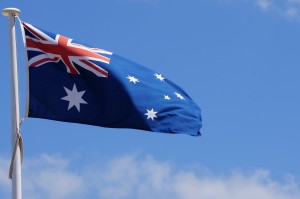For many years I have been saying that Australian students in primary and secondary schools (up to Year 10) should study Australian history as a compulsory subject. As a nation shouldn’t we teach our children the history of our country? If we don’t study our past, how can we prepare for the future? By studying our country’s history we can learn about what we as a nation, society, community did or do well and we can learn from our mistakes.
The obvious question is “what will be taught in Australian History”? I would suggest everything! We should teach our children Aboriginal history and culture. Our children should learn about European exploration to Australia, white settlement and its impact on indigenous people, how the colonies were established, the significance of Federation, our involvement in wars etc.

Basically we need to teach our children facts about Australia. For instance, students should know about The First Fleet, they should know about the Rum Rebellion and they should know who the first Prime Minister of Australia was. Students should know how Australia got involved in various wars, they should know about Gallipoli or how Darwin was attacked by the Japanese in World War 2, they should know about Kokoda and our involvement in the Vietnam and Gulf Wars. Students shouldn’t study our involvement in war in order to glorify war but rather to get a better understanding of how our involvement impacted our society and to appreciate more deeply the sacrifice our military personnel made for their and our country.
As part of studying Australian History, students should learn about how farming and industry began and evolved in Australia. They should get a better understanding of how our economy works, who our main trading partners are and how the labour force has changed. Students should learn about our scientific, sports, artistic and entrepreneurial achievements. Students should even know when television first started in Australia, when we moved from the pound to the dollar as our currency and who are the people featured on our paper currency. Students should also learn about major Australian projects such as the Snowy Mountain scheme, Australian architecture and how the major cities and towns were first established and how they grew.
Students should also learn about the history of Australian politics such as our political system, the formation of the key political parties, our system of voting, the Constitution and why Federation was a significant event. By studying these aspects of Australia’s history students will get a better appreciation of how the politics and policies of today will have an impact on their future and their children’s future. They may even appreciate that voting is compulsory in Australia and that freedom of speech is something we are lucky to have.
As Australia is considered by many as a “multicultural” nation, students should learn about the history of immigration to Australia. Students should learn about the British migration, Afghan and Chinese migration in the latter part of the 1800s, they should know about the White Australia Policy, post war immigration and immigration trends of the last 30 years. By studying the history of immigration to Australia, this will give students a greater understanding and a greater appreciation of the different customs and traditions Australians follow.
Interestingly, before somebody becomes an Australian citizen they need to pass the citizenship test. Frankly, I think a lot of people born in Australia would struggle passing the test and that should NOT be the case. How can we expect people new to Australia to pass a test when many people born here may not pass? Don’t get me wrong here, I like the citizenship test. It’s a good way to get people to learn about their new country. However, my expectation is that our children should be taught Australian history so that they know and understand their country better.
As I stated earlier, students should learn about Aboriginal history and culture. Students should know about how indigenous people lived in Australia before and after European settlement. Students should learn about the Dreamtime and why certain places are considered sacred by indigenous people. They should know about the Mabo case and the different views on this case. Students should know the meaning of the term the “stolen generation” and the significance of the then Prime Minister Kevin Rudd’s apology in 2008. Students at a minimum should be aware that many names of places (including the suburb or town they live in) in Australia originate from Aboriginal words!
Interestingly, a good friend of mine who I respect immensely disagreed with my idea that studying Australian history should be compulsory because, according to him, history is a “…tool that can be used for good and evil”. I guess from my perspective there are many things in life that can be used for good and evil. For instance, if a crazed person goes on a shooting spree, the gun is considered by many people to be an evil thing but if a policeman uses a gun to stop the crazed person from killing more people, then many people would say the gun is a good thing. I sincerely don’t think that our educators in Australian schools will use the study of Australian history for evil purposes…in fact I don’t think my friend believes this too.
Furthermore, my friend argued against the compulsory study of Australian history because according to him “History is not objective.” I somewhat agree that history can be subjective especially if only one perspective is taught. However, a fact is a fact. Can anybody dispute the fact that Federation took place on January 1st 1901? Can anybody dispute the fact that the Olympic Games were held in Melbourne in 1956 and in Sydney in 2000? Can anybody dispute the fact that Sir Robert Menzies was the longest serving Prime Minister of Australia?
In order for history to be objective, I strongly believe that all perspectives of a topic should be presented. For instance, it is a fact that Australian troops were sent to fight in the Vietnam War. Some Australians were in support of this action and some Australians were not. Part of the study of history should be an examination as to why people were for or against the involvement in the war. Another example is the dismissal of the Whitlam government in 1975. Some people in the Australian community were against the dismissal and some people were for the dismissal. These are the facts. There is nothing subjective about this. It is the role of the educator in the classroom to present these facts to their students for analysis and for the students to make up their own mind about the events that took place on November 11, 1975.
Our children are entitled to know the facts about our country. They need to learn about our successes and our failures. They need to understand our culture and they need to be proud Australians. By studying history, students will get a better appreciation of what it means to be Australian.
For the record, I studied Australian History in Year 12 and I studied Australian History for 1 semester at university. I had great teachers who presented the facts and then made us analyse the research that was undertaken on various aspects of Australia history. While doing this analysis I not only learnt a lot but I got a greater appreciation of what it means to be Australian.
I’ve always felt proud to be Australian. My grand-parents and my parents arrived in Australia in the 1960s and they always told me that Australia was the best country in the world. I always felt this was true even when I had to deal with a few ignorant racists as a kid. Nevertheless, the more we did Australian studies at school the more patriotic I became.
If, like many people believe, Australia is a multicultural society then we must teach children who were born overseas the history of their adopted country. While it is wonderful that these children maintain their parents’ culture and tradition it is also imperative that these children learn about the history of their new country. By studying Australian history they will better understand their new country and in the future they will feel more Australian and thereby will be loyal to Australia.
We are so lucky to live in Australia. Our history is not perfect but then again which country’s is? Students should learn Australian history so that they get a better appreciation and understanding of our country and to feel proud of being Australian. We shouldn’t feel proud to be Australian only on Australia Day. We should feel proud to be Australian every day and by studying our nation’s history, our children and therefore future generations will continue to make this country great.
BY STEVE YANKO
PS. To try a practise citizenship test.
https://www.citizenship.gov.au/learn/cit_test/practice/
The following are some Australian History books that I enjoyed reading as a student:
Triumph of the Nomads: A History of Aboriginal Australia – Geoffrey Blainey
The European Occupation: Focus On Australian History – Tim Gurry
The Oxford History of Australia. Vol 4: 1901-42 – The Succeeding Age – Stuart Macintyre
The Oxford History of Australia. Vol 5: 1942-88 – The Middle Way – Geoffrey Bolton
© STEVE YANKO 2014
